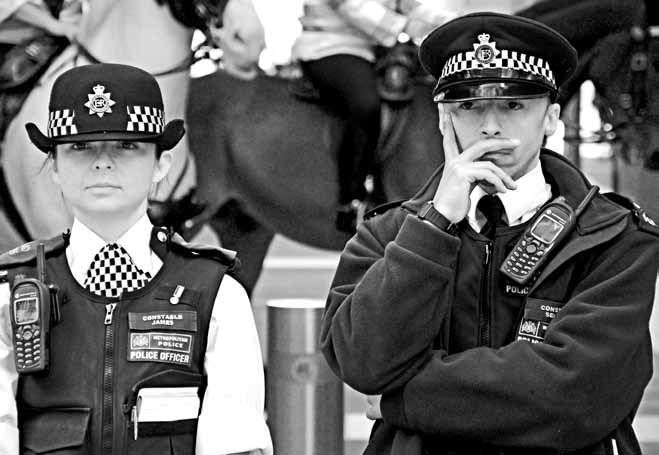 The police snoop on protests and protesters in many ways. They call it ‘intelligence gathering’. Some of this is done by murky methods, with undercover police and informants, but a lot of it is open, obvious and in-your-face.
The police snoop on protests and protesters in many ways. They call it ‘intelligence gathering’. Some of this is done by murky methods, with undercover police and informants, but a lot of it is open, obvious and in-your-face.
The Forward Intelligence Teams (FIT) and their methods of intelligence gathering should not be tolerated by anyone who genuinely wants to see any form of social change. FIT’s function is to gather data, and then use this information to disrupt, intimidate and harass those involved in political dissent.
There are some key things which everyone should know: for starters, how to recognise the FIT. Don’t make it easy for them to take your photograph. Look away, keep your head down (literally!), block the cameras, wear a mask, do whatever you need to do, but try to keep your picture out of their image database.
Don’t give them your name and address. They can insist on it if you have committed an offence, caused harassment, alarm or distress, or are driving a car, but can’t otherwise. Don’t give it. Say no.
Frequently asked questions:
“Why should I stop them taking my picture or having my name and address? I have nothing to hide.”
FIT does not just collect details of people who have done something wrong. If you are an organiser of protests, a member of a specific group, or simply someone they see about a lot, you have become a person ‘of interest’. Your description, name and details (if they have them), and your photo will be put on a database. You will have your own police file and may even be designated as a ‘domestic extremist’.
Many people think that ‘masking up’ is just for people who are intending to commit crime. It should be for all of us at any time that we are engaged in political protest and the FIT teams are out.
“I’m on a database, should I be afraid to attend protests?”
Fear of being on a police database definitely shouldn’t stop you from being active and participating in the politics you believe in. But being ‘known’ can present some challenges. Cops you’ve never met before may call you by name. You might find your car gets stopped on the way to protests, or that you become the target of more intrusive surveillance methods. You may be more likely to be arrested. It’s not as if you are going to be ‘disappeared’ – but it is unpleasant, intimidating, and best avoided.
It’s also unclear as to what happens to these details once they are on the database. The police operate a policy of sharing information with anyone, if it is for ‘policing purposes’. Blacklists emanating from the police have been known to find their way to employers. It probably won’t happen to you, but there are only two ways to avoid the risk altogether: a) give up politics or b) stop the FIT taking your details!
“I’m already on a database, so why should it matter anymore?”
Yes and no. The police do not just compile lists of activists. They also constantly watch to see who is involved with what, and how networks change and develop. They then use this information to organise further surveillance and ‘disruption’, which could be anything from sending in undercover cops to making it more difficult for you to get a space to meet in.
If you are already on a database, it is still very much in your interests – in all our interests – that you don’t give them any more information than they already have. They don’t want to just know who you are, they want to know how involved you are, how well networked you are, how committed you are. If you are ‘of interest’ they will be interested in who you know, who you hang around with, and what protests you’ve been on.
Resisting the FIT is not an optional extra – it’s an essential part of building a social movement that can bring about change. Don’t talk to them, don’t let them take photos of you, and keep your name for your friends.
By FITwatch – http://www.fitwatch.org.uk/









